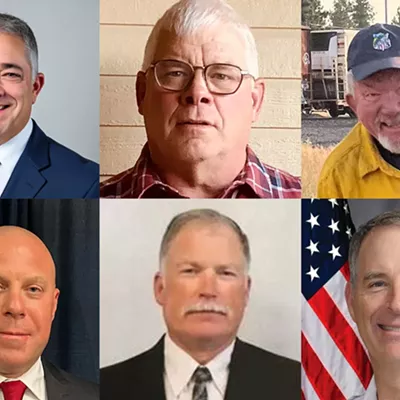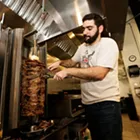The annual two week-long celebration of music known as the Festival at Sandpoint is distinguished for exposing Inland Northwest residents to exceptional artists in an open-air setting that is intimate, casual and breathtakingly beautiful. Under the summer evening sky, the whole family can stretch out on the grass of Memorial Field on blankets or lawn chairs (low backed varieties down in front, please) with whatever food and beverages they can cram into an ice chest and ease into pure listening enjoyment. For those traveling light, the festival's 16 food booths and bar promise to keep you well fed and watered for the duration.
The Festival launches its 2001 season on Thursday, Aug. 2, with a performance by one of the most distinctive and enigmatic figures in rock. Over the course of a 30-year music career, characterized by multiple personal and professional triumphs and failures, Warren Zevon has retained his position as a songwriter admired by his peers and revered by discerning music lovers. Whenever he sees fit to release an album (it doesn't happen every day -- or even every half-decade), the hardcore fans show up in support.
Zevon first appeared as a blip on the popular music consciousness in 1970 with the release of Wanted Dead or Alive. The album was a commercial flop, and Zevon retreated back to the session work that had previously sustained him. It wasn't until he teamed up with Jackson Browne six years later that the accolades started piling up. Browne produced Zevon's 1976 self-titled album, a deeply lyrical albeit stark and unflattering portrayal of "me generation" Southern California attitudes and Hollywood life. The heroes of Zevon's songs were never the beautiful people but the destitute, the despondent and the drug addled, who, despite their weaknesses and failings, manage to find salvation or, at least, survival. His next album, Excitable Boy, was equally as good and produced an unlikely hit in the form of the quirky, "Werewolves of London."
But praise and commercial success weren't enough to keep his feet out of hell. Zevon sat out for a couple years to battle his alcohol habit before returning in 1980 with Bad Luck Streak in Dancing School. The remainder of his '80s catalog is erratic with huge gaps in output coinciding with his various attempts at rehab. A collaboration with the members of R.E.M. (on 1987's Sentimental Hygiene and as a member of the Buck-Mills-Berry side project, Hindu Love Gods) marked the beginning of a clean and sober era for Zevon -- an era that has seen releases from the sardonic L.A. sage every few years or so.
After a five-year recording drought, Zevon resurfaced in 2000 with Life'll Kill Ya. The songs that made it onto the album started out as basic tracks recorded in his home studio. Typical of the mercurial Zevon, the songwriter had no plans for the material (he was unsigned at the time).
"It took me about three years," says Zevon of the writing process that eventually became Life'll Kill Ya. "Every so often, I would put three songs on a tape and give them to a friend."
One of those with a sympathetic ear was Zevon's longtime ally and friend, Jackson Browne.
"I played one of the tapes for Jackson Browne while we were sitting in my car. And [he] asked, 'What are you going to do with these?' And I said, 'Nothing.' "
Impressed by what he had heard, Browne couldn't leave it alone. He convinced Zevon to send the tapes to the newly hatched indie label, Artemis Records. Soon, the songwriter had a deal.
Life'll Kill Ya is instrumentally sparse (predominantly piano and guitar with minimal bass and drum backing) populated by typical Zevon-esque character types and imbued with a backhanded but indomitable sense of hope.
"Before this album, I had been in semi-retirement mode," says Zevon. "I'd play a benefit here and there or do the Letterman show if they called [David Letterman is a huge fan, and Zevon sits in for Paul Shaffer when he's out], but I had basically been taking my retirement and learning to play the flute. I think one of the keys to my personal happiness and my personal chaos is that I never get anything down to a science. Every time I get on stage, I still kind of think, "What am I doing here?' "
The Festival continues through Aug. 12 with the Spokane Symphony Orchestra's "Going for Baroque" concert conducted by Gary Sheldon (Aug. 3), the Super Saturday Concert featuring the slack-key Hawaiian group, Keola Beamer & amp; Family, Celtic rock band Scruj MacDuhk and country star, Lee Ann Womack (Aug. 4). The Festival for Families concert with the Spokane Symphony doing its popular Carmen Sandiego show is on Aug. 5 at 4:30 (all other concerts begin at 7:30 pm). On Aug. 8, neo-swing hipsters Big Bad Voodoo Daddy perform. Dancehall reggae superstar, Yellowman, takes the stage on Aug. 9. Festival organizer Dyno Wahl's personal fave, Canadian country rockers, Blue Rodeo perform on Aug. 10. Jazz man Branford Marsalis appears on Aug. 11, and the Spokane Symphony with vocal soloist Marina Lomazov closes the festival on Aug. 12.
The Festival at Sandpoint is at Memorial Field, Sandpoint, on Aug 2-5 and
Aug. 8-12. Tickets are $20.50-$35 per evening. Passes for all nine evenings are available for $129. Call: 325-SEAT.














